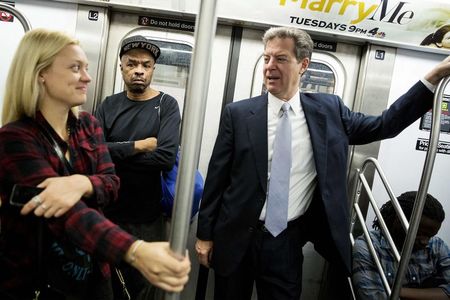By Megan Davies
NEW YORK (Reuters) - U.S. voters' readiness to face tough issues such as pension reform rather than simply kick the can further down the road will be put to the test next week as two-thirds of state governor posts go up for election.
A handful of the Nov. 4 races such as the dead heat in Illinois, possibly the most fiscally dysfunctional state, shape up as de facto referendums on reform and their results could make municipal bond investors alter their bets.
"People are not so much voting for governor in some of these states but how they want the pensions addressed," said Craig Brandon, Co-Director of Municipal Investments at Eaton Vance in Boston.
Investors want to see the states tackling chronic underfunding of pension plans that over-promised and failed to deliver in the wake of the 2008-2009 global financial crisis.
Out of 36 races scheduled alongside mid-term congressional elections investors will focus on those that involved big issuers and could change the state's budget fortunes.
Over the past two decades, California, New York, Texas, Florida, Illinois, Pennsylvania, New Jersey, Massachusetts, Ohio and Michigan - and public entities in those states - have been the top issuers in the $3.7 trillion municipal debt market, according to Thomson Reuters data. All but New Jersey are holding governor elections next week.
The estimated funding shortfall for current and future payouts of top 25 U.S. public defined benefit pension plans has tripled to at least $2 trillion in less than a decade, Moody's ratings agency said last month.
"If you've got pension fund costs going up at an astronomical rate and revenues going up at a much more reduced rate - you can't get blood from a stone," said John Mousseau, director of fixed income at Florida-based Cumberland Advisors. "Everyone's got to share in the solution."
TAX DILEMMAS
Raising taxes is one such solution and whether the states follow that route could be a deciding factor in some races.
In Illinois, which has the most underfunded retirement system among U.S. states with a $100 billion uncovered pension liability, incumbent Democratic governor Pat Quinn wants to turn a temporary income tax rise enacted in 2011 into a permanent one.
His Republican opponent Bruce Rauner wants to phase it out and suggests savings instead, such as ending the practice of ramping up state employees' pay before they retire to boost their pensions.
"The permanence of that tax increase would make it a better credit," said Peter Hayes, Head of BlackRock's Municipal Bonds Group, which holds a variety of Illinois-based debt. Hays said that could potentially make the group notch up its exposure to the state's debt.
Some investors also see merits in Rauner's proposals.
"I would think that Rauner offers some long term hope for altering the business-as-usual approach," said Chicago-based John Miller, co-head of fixed income at Nuveen, which has around $530 million in Illinois State general obligation bonds.
The election looks set to come down to the wire with a Chicago Tribune Oct. 23 poll showing Rauner with 45 percent support and Quinn had 43 percent.
While tax hikes are inherently unpopular, cutting costs is also difficult with several such efforts challenged in courts.
In Kansas, governor Sam Brownback chose to do the polar opposite and slash taxes hoping to spur the economy.
The state is a minor player in the municipal debt market, but the race there is interesting because it shows how doing what is seemingly popular is not a sure winner either.
The tax cuts triggered a Standard & Poor's credit downgrade in August and polls in local media show Brownback trailing rival Democrat Paul Davis who promises to end the incumbent's "experiment."
Bond investors will also watch races Pennsylvania and Rhode Island.
Rhode Island candidate Gina Raimondo, the Democrat state Treasurer and a former venture capitalist, led some of the nation's most far-reaching pension reforms in 2011 that drew lawsuits from public sector unions over benefit cuts.
Cumberland's Mousseau said extending retirement ages and raising workers' contributions were hardly "anything magical" - but showed leadership and he would view the state's bonds more favorably if Raimondo were to get elected.
Eaton Vance's Brandon also said he would be watching Rhode Island race.
"Labor does not like her, but I think the average person on the street who doesn't have a state pension likes what she says."
In Pennsylvania, where Governor Tom Corbett is trailing Democratic opponent Tom Wolf, the hot-button issues are the governor's cuts in education funding and escalating pension liabilities which contributed to a recent credit ratings cut.
Corbett's pension reform proposals failed to gain traction during his term while Wolf says he favors maintaining the status quo for public employees' pension plans and BlackRock's Hayes sees the election as one of the most fiscally important.
Some ballot initiatives are also catching investors' attention, including one in California, where voters will decide whether to require that surplus revenues are saved for its Rainy Day Fund and used for emergencies, debts or budget deficits.
Democratic Governor Jerry Brown, who has turned around the state's finances after years of deficits, is ahead in the polls against Republican Neel Kashkari, according to local media.
Hayes said in a research note that California's Rainy Day ballot proposal has the potential to significantly improve the state's future financial flexibility and credit rating.
"We always want the outcome that gives a better credit profile for any city or municipality," said Hayes.

(Additional reporting by Hilary Russ; Editing by Tomasz Janowski)
